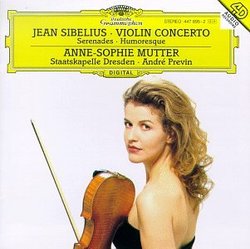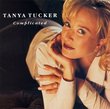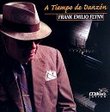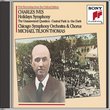| All Artists: Jean Sibelius, Andre Previn, Dresden Staatskapelle Title: Jean Sibelius: Violinkonzert/Serenaden/Humoreske Members Wishing: 0 Total Copies: 0 Label: Deutsche Grammophon Release Date: 2/13/1996 Genre: Classical Styles: Forms & Genres, Concertos, Historical Periods, Modern, 20th, & 21st Century, Instruments, Strings Number of Discs: 1 SwapaCD Credits: 1 UPC: 028944789522 |
Search - Jean Sibelius, Andre Previn, Dresden Staatskapelle :: Jean Sibelius: Violinkonzert/Serenaden/Humoreske
 | Jean Sibelius, Andre Previn, Dresden Staatskapelle Jean Sibelius: Violinkonzert/Serenaden/Humoreske Genre: Classical
The very first notes of this extraordinary performance show how thoughtfully Anne-Sophie Mutter has approached the work. Sibelius's marking for the solo violin is dolce ed espressivo, which for most violinists would mean "... more » |
Larger Image |
CD DetailsSynopsis
Amazon.com essential recording The very first notes of this extraordinary performance show how thoughtfully Anne-Sophie Mutter has approached the work. Sibelius's marking for the solo violin is dolce ed espressivo, which for most violinists would mean "with vibrato." But Mutter plays senza vibrato and achieves a hauntingly expressive effect over the muted pianissimo oscillations of the orchestral violins. Happily, she sustains this high level of engagement with the score through the entire account, playing the taxing solo part with riveting intensity, making every note count, producing a gloriously rich and varied tone, and giving the listener a memorable musical experience in the process. The effect of all this on André Previn and the Staatskapelle Dresden, to paraphrase Mark Twain, appears to have been prompt and electric. They give a spectacular reading of the score, one notable for both its sonorous depth and its sense of atmosphere. --Ted Libbey Similar CDs
Similarly Requested CDs
|
CD ReviewsA.-S. M. presents a breathtaking view of this recording. 09/02/1999 (5 out of 5 stars) "Being a musician myself, I am always trying to find that archetypal recording that you can excitedly recommend to your friends. This recording of the Sibelius Concerto surpasses that adventure. Whether it has been the dull and dry workings of Itzhak Perlman, the rushed and emotionless circus of Jascha Heifetz, or the silly and unprepared version of Sarah Chang's, neither have even come close to Anne's superb interpretation. The haunting opening of the first movement causes you to turn up the volume just to make sure that your ears can hear the tonal perfection of Anne-Sophie. The Staatskapelle is amazing with its sonorous orchestral interludes and awe-inspiring dynamics, especially in the quickest, most-exciting finale I have ever heard. The ending harmonic still rings in my ear. The second movement is emotionally riveting. It constantly builds up and drops from a climax until the final, tear-jerking explosion of sound. In the third movement, Anne's perfectly forged thirds, quadruple stops, and wrist-crippling jumping octaves are a force that has yet to be reckoned with. The Serenades and Humoreske are also a unique and great addition to this disk. The haunting melody under improvisation in one, the jokingly emotional turns in another and the haunting melody of another bring to a close one of my favorite discs of all time. I highly recommend this recording because I have tried the rest and they don't pass the test." A most original performance of this warhorse P. Rah | Sion, Switzerland | 04/29/2001 (5 out of 5 stars) "Mutter is a performer who has become one of the most fashionable, and original of violinists. She has the most sweet but intense tone that is suitable for Romantic works, and I was a little sceptical (though I am a huge fan) whether she could be convincing in the Sibelius. But I could not have been more wrong. It is one of the most impassioned acccounts I have ever heard. She plays her entry without vibrato, to startling effect. Very original, as I don't know of other performances which start this way. Gradually she uses full vibrato, and in her hands, every note means something. The second movement is simply gorgeous. It is very sweet-sounding at first, but one realises that she uses the darkest tone colour to create a very 'Nordic' atmosphere. In a word, gorgeous. The third movement is the most impressive. Throughout the performance, her use of rubato is used to amazing effect, but in the last movement, all hell breaks loose. She lets rip, without loss of control. Mutter sounds so gutsy and impassioned that I wondered if she had broken any strings during the recording. I'm sure she did. The Sereneades and Humoreske are wonderfully played, and although musically less subtantial than the concerto, the small pieces, the Humoreske especially sound happier than a lot of Sibelius' music. Wonderfully imaginative couplings. The playing of the Dresden Staatskapelle under Previn is first class. The placing of microphones over certain sections of the orchestra in several passages could have been different. For example, in the last movement, the 'wrong' instruments are given more prominence over the 'right' instruments (the brass are too prominent in some bits, where the strings should be the dominant players). Nonetheless, it doesn't detract from the whole performance and the sound generally is superbly engineered. Clean, with an airy atmosphere, which is very apt in the concerto. A wonderful disc, albeit a little short at 47 minutes for a full price disc. My benchmark recording would be the classic 1970 Kyung-Wha Chung version on Decca, also under Previn (but with the London Symphony Orchestra). The playing of the young Chung may be less polished technically, but it is an altogether electric recording that will be hard to beat. Still, this Mutter version comes verrrrrrrrrrrrry close." One of my favorites NotATameLion | Michigan | 06/07/2000 (5 out of 5 stars) "This disc is one of the warhorses in my music collection. Very few discs have received as much play on my stereo. It was my first disc of music from both Sibelius and Anne-Sophie Mutter; both have become personal favorites. The Concerto for Violin and Orchestra in D minor, op. 47 is hands down my favorite violin concerto. It begins in beauty, moves on to startling beauty, and finishes in the sublime. The Staatskapelle Dresden, under the direction of Andre Previn, plays this music with vigor and grace. The strings are especially warm and supple. I cannot imagine the concerto being played any better than it is here. The disc includes, as well as the concerto, two Sibelius serenades and a humoresque. Anne-Sophie Mutter plays all of these brilliantly. She exudes the emotion of the music without being overpowering. This disc is a masterpiece. I recommend it for everyone."
|

 Track Listings (6) - Disc #1
Track Listings (6) - Disc #1












